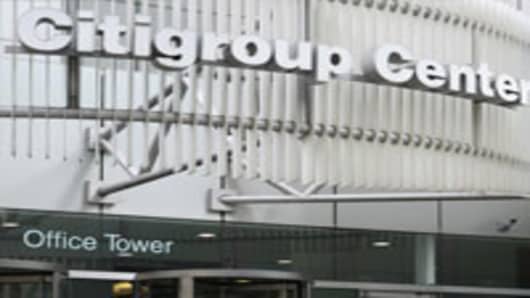CitigroupChief Executive Vikram S. Pandit is expected to resist calls from investors to break up the banking giant -- including spinning off the Smith Barney brokerage firm -- as part of his review of Citigroup's operations, sources told CNBC.
Pandit is concluding that a leaner Citigroup is the way to go, and he is still expected to shed as many as 24,000 jobs over the next year. He also is expected to get out of some low-margin businesses and cut the workforce through attrition.
Even so, he appears resigned to keeping Citigroup's full service model as is. Smith Barney was very profitable last year.
Still, Pandit has not completed his review of Citigroup's situation and his plans could change. Pandit's current leanings follow meetings with a number of current and former Citigroup officials.
A Citigroup official had no comment.
If Pandit stays on the course he has signaled and does not radically alter the composition of Citigroup, investors may be disappointed and start selling shares.
Many investors believe the financial services conglomerate model Citigroup has used since the firm was created by combining the Travelers Group insurance and brokerage company with banking giant Citibank does not produce the earnings growth they can get from smaller, more specialized financial firms like Goldman Sachs.
Pandit may make some of his intention public in the coming weeks.
Earlier this month, Citigroup posted a nearly $10 billion fourth-quarter loss, about twice analysts' estimates, and said it was raising $14.5 billion, slashing its dividend and cutting 4,200 jobs.
The capital infusion from investors including Singapore's government, former Citigroup Chief Executive Sanford "Sandy" Weill and Saudi Prince Alwaleed bin Talal, Citigroup's largest individual shareholder, may help the largest U.S. bank steer through the credit market and housing crises, though analysts said Citigroup faces a tough road ahead.
Citigroup's fourth-quarter loss of $9.83 billion was its first since the bank was created in 1998 from the merger of Citicorp and Weill's Travelers Group. But it should be noted that Smith Barney was very profitable last year.
It stemmed largely from $18.1 billion of write-downs and related expenses for exposure to subprime mortgages, plus a $5.41 billion increase in credit costs, including a $3.85 billion charge to boost reserves.
The net loss of $1.99 per share was roughly twice as large as analysts expected. Citigroup cut its quarterly dividend 41 percent to 32 cents per share from 54 cents, a move that could save it about $4.4 billion a year.
Citigroup said it is raising $12.5 billion from a private sale of convertible preferred securities. It said this includes $6.88 billion from a Singapore fund, and investments from Weill and his family foundation, Alwaleed, the Kuwait Investment Authority, the money manager Capital Research & Management, and the state of New Jersey.
Citigroup also plans to sell an additional $2 billion of convertible preferred securities, and other preferred securities.
The new investments are on top of a $7.5 billion infusion that Citigroup got in November from Abu Dhabi's government, in exchange for a 4.9 percent stake.
"We are taking comprehensive action to position Citi for the future with the capital strength that will allow us to refocus on earnings and earnings growth," Pandit, who became chief executive in December, said in a statement. Pandit also called fourth-quarter results "clearly unacceptable."
--Reuters contributed to this story


